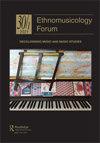Migration, music and the mobile phone: a case study in technology and socio-economic justice in Sicily
IF 0.5
1区 艺术学
0 MUSIC
引用次数: 2
Abstract
ABSTRACT The role of the mobile phone among people on the move has featured in several disciplinary discussions in recent years, but it remains relatively neglected by ethnomusicology. Exploring the gap, this article draws observations from Media and Communications Studies, Migration Studies and Anthropology to bear on a participatory music education project that the author led among unaccompanied migrating minors in Sicily 2017–2019. It interrogates the ethics of music research among migrant communities particularly when it involves participatory work such as performing, recording and publishing music. It also examines how Africans are caught up in, and negotiate, the racist colonial legacies that continue to inform musical consumption in Italy. The central arguments of the article are that mobile phones empower participants in their day-to-day lives and music-making, but have complex social consequences; and that within a macro socio-economic sphere, phones link participants ever more tightly and more powerfully into the historical chain of mass production that is exploiting humanity and the environment. Ethnomusicologists would do well to turn their attention more critically towards phones and related audio technologies, and reflect on the very deep socio-political entanglement in which all our networked lives – migratory or settled – are caught.移民、音乐和手机:西西里岛技术和社会经济正义案例研究
摘要近年来,手机在流动人群中的作用在一些学科讨论中占有重要地位,但它仍然相对被民族音乐学所忽视。在探索这一差距时,本文从媒体与传播研究、移民研究和人类学中得出了一些观察结果,这些观察结果与作者在2017年至2019年西西里岛无人陪伴的移民未成年人中领导的参与式音乐教育项目有关。它质疑移民社区音乐研究的伦理,尤其是当涉及表演、录制和出版音乐等参与性工作时。它还考察了非洲人是如何陷入并谈判种族主义殖民遗产的,这些遗产继续影响着意大利的音乐消费。这篇文章的核心论点是,手机赋予参与者日常生活和音乐创作的权力,但会产生复杂的社会后果;在宏观社会经济领域,手机将参与者更紧密、更有力地连接到剥削人类和环境的大规模生产的历史链条中。民族音乐学家最好将注意力更批判性地转向手机和相关音频技术,并反思我们所有的网络生活——迁徙或定居——都陷入了非常深刻的社会政治纠缠。
本文章由计算机程序翻译,如有差异,请以英文原文为准。
求助全文
约1分钟内获得全文
求助全文
来源期刊

Ethnomusicology Forum
MUSIC-
CiteScore
1.10
自引率
25.00%
发文量
29
期刊介绍:
Articles often emphasise first-hand, sustained engagement with people as music makers, taking the form of ethnographic writing following one or more periods of fieldwork. Typically, ethnographies aim for a broad assessment of the processes and contexts through and within which music is imagined, discussed and made. Ethnography may be synthesised with a variety of analytical, historical and other methodologies, often entering into dialogue with other disciplinary areas such as music psychology, music education, historical musicology, performance studies, critical theory, dance, folklore and linguistics. The field is therefore characterised by its breadth in theory and method, its interdisciplinary nature and its global perspective.
 求助内容:
求助内容: 应助结果提醒方式:
应助结果提醒方式:


